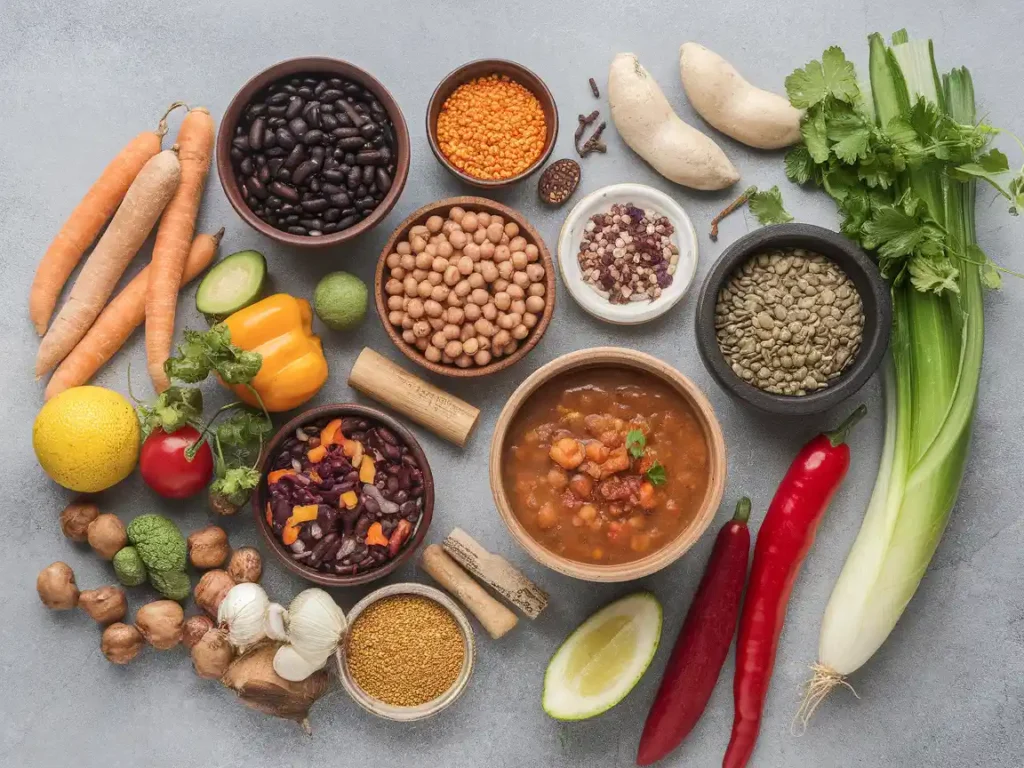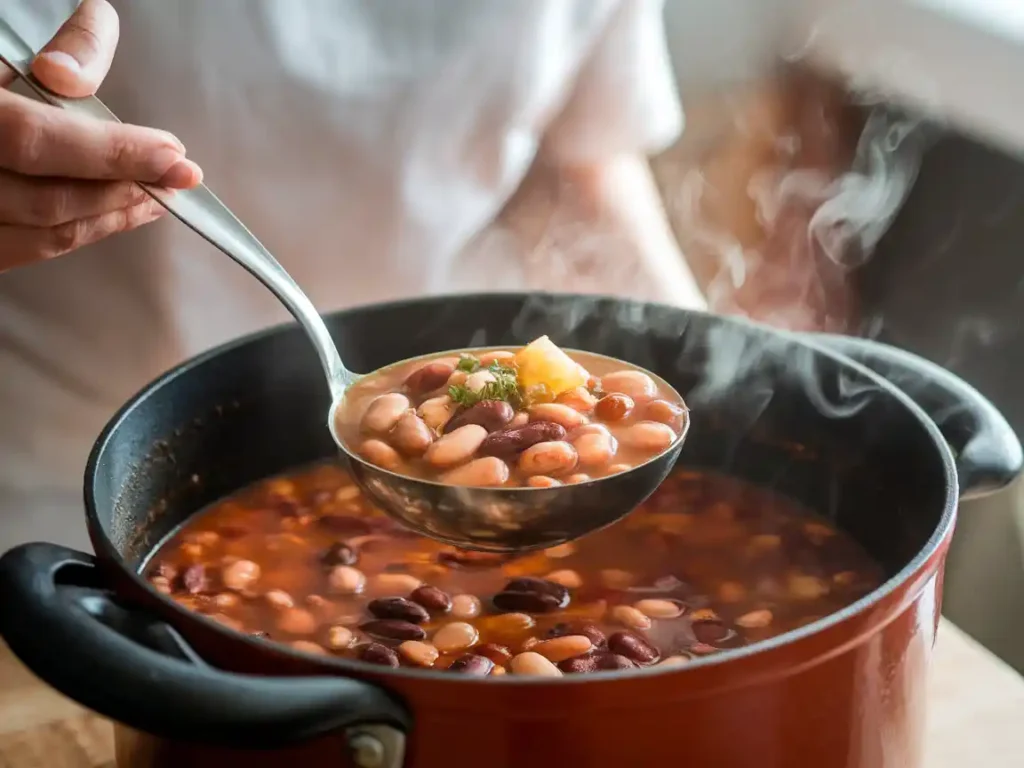If you’re looking for a hearty, comforting meal that doesn’t sabotage your weight loss goals, bean soup might just be your secret weapon. But is it really as healthy as people claim? The short answer: Absolutely, when prepared the right way! With its blend of high fiber, plant-based protein, and minimal calories, bean soup can fill you up without filling you out. Let’s dig into why this humble dish deserves a spot in your weight loss toolkit.
Table of Contents
The Nutritional Power of Bean Soup
To understand the health benefits of bean soup, we need to zoom in on its nutritional value. Packed with complex carbohydrates, vitamins, minerals, and a good dose of protein, this soup is like the Swiss Army knife of healthy eating.
H3: Macronutrient Composition of Bean Soup
Beans are a nutritional powerhouse. They’re loaded with protein and fiber, both of which are essential for weight loss. Protein helps preserve muscle mass during calorie deficits, while fiber slows digestion, keeping you fuller longer.
A typical serving of bean soup contains:
- Protein: Around 10–15 grams per cup.
- Fiber: A whopping 6–10 grams, depending on the type of beans used.
- Calories: Just 150–250 per serving (if you keep it simple).
This means you’re getting plenty of nutrients without a calorie overload.
“Beans are nature’s gift to anyone looking to lose weight while staying nourished.”
Vitamins and Minerals in Beans
Beans are rich in essential vitamins and minerals, including folate, magnesium, iron, and potassium. These nutrients not only support overall health but also play a role in metabolism and energy production, which are crucial for weight loss.
Magnesium, for instance, helps regulate blood sugar levels, while potassium can help counteract the bloating caused by high sodium intake.
Fiber Content: A Weight Loss Ally
Here’s the magic of fiber: it adds bulk to your meals without adding calories. Foods high in fiber, like bean soup, are digested more slowly, which can curb hunger and help you eat less throughout the day. Plus, fiber supports gut health, which is increasingly linked to maintaining a healthy weight.
So, when your mom told you beans were good for you, she wasn’t kidding!
How Bean Soup Supports Weight Loss
Bean soup isn’t just a tasty way to stay warm on a cold day it’s a weight-loss champion. Here’s how it does the heavy lifting when it comes to helping you shed those extra pounds.
Satiety and Hunger Control
Ever notice how some meals leave you hungry an hour later? Not bean soup. Thanks to its protein and fiber, it keeps you feeling satisfied for hours. That means fewer mid-afternoon snack attacks and late-night cravings.
Protein, in particular, has a high “thermic effect,” meaning your body burns more calories digesting it compared to fats or carbs. And fiber? It’s like a sponge, soaking up water and expanding in your stomach to keep you full.
Low-Calorie, High-Volume Meals
One of the biggest challenges with dieting is portion control. But with bean soup, you can eat a generous portion without breaking the calorie bank. Its high water content adds volume to your meals, tricking your brain into thinking you’re eating more than you actually are.
Imagine eating a tiny sandwich vs. a big bowl of steaming bean soup what feels more satisfying?
Impact of Fiber on Metabolism
Fiber does more than just keep you full; it also supports a healthy metabolism. Studies suggest that people who eat more fiber tend to weigh less and are better at maintaining their weight loss over time. Fiber also helps regulate blood sugar levels, preventing those energy crashes that lead to overeating.
“The fiber in bean soup is like a personal trainer for your metabolism keeping it steady and strong.”
Protein in Bean Soup for Muscle Preservation
Here’s a little-known fact: Losing weight isn’t just about burning fat. It’s also about preserving muscle. When you’re in a calorie deficit, your body might burn muscle for energy, which isn’t ideal.
The protein in beans helps combat this by providing your body with the building blocks it needs to maintain muscle mass. So, while you’re trimming fat, you’re keeping your muscles intact win-win! 💪
Common Ingredients in Bean Soup and Their Benefits

What goes into your bean soup can make or break its healthiness. Let’s take a look at some common ingredients and why they’re good for you.
Types of Beans and Their Properties
Not all beans are created equal, but most are great for weight loss. Here are some popular options:
- Black Beans: High in antioxidants and great for heart health.
- Chickpeas: Loaded with protein and iron, making them ideal for vegans.
- Lentils: Low-calorie and rich in folate and potassium.
- Kidney Beans: Full of fiber and slightly sweet, they’re perfect for soups.
Vegetables That Enhance Nutrition
Adding vegetables like carrots, celery, tomatoes, and spinach not only boosts the flavor but also ramps up the vitamin and mineral content. Plus, they’re super low in calories, so you can load up without worry.
For example:
- Carrots add beta-carotene, which supports eye health.
- Spinach is rich in iron and calcium, essential for overall health.
- Tomatoes bring in lycopene, a powerful antioxidant.
Spices and Herbs for Weight Loss
Did you know that your spice rack might be the key to spicing up your weight loss? Ingredients like cumin, turmeric, garlic, and cayenne not only add flavor but can also help with fat burning and digestion.
Turmeric, for instance, has anti-inflammatory properties, while cayenne can boost metabolism by raising your body temperature.
Healthy Broth Options for Bean Soup
The base of your soup matters! Using a vegetable or low-sodium chicken broth instead of cream-based options keeps the calorie count low. Avoid broths loaded with sodium, as too much salt can lead to water retention and bloating.
Preparing Bean Soup for Maximum Weight Loss Benefits

Bean soup is versatile, but not all versions are weight-loss-friendly. How you prepare it can significantly impact its nutritional value. By using the right methods and avoiding calorie traps, you can maximize its health benefits.
Cooking Methods That Retain Nutrients
When preparing bean soup, simplicity is key. Opt for cooking methods that preserve the nutritional value of the ingredients. Slow cooking, for instance, helps retain the vitamins and minerals in beans and vegetables.
Pressure cooking is another excellent option. It reduces cooking time while locking in nutrients. Plus, it makes dried beans soft and digestible, so you can avoid the extra sodium found in canned varieties.
Want an easy hack? Always soak your beans overnight before cooking. This reduces cooking time and helps break down compounds that can cause bloating.
Avoiding Unhealthy Additions
Here’s where people go wrong with bean soup: loading it up with cream, cheese, or fatty meats. These ingredients can skyrocket the calorie and fat content, turning a healthy meal into a diet disaster.
Stick to plant-based oils like olive oil, or skip the added fat altogether. If you’re craving a creamier texture, try blending part of the soup for a thicker consistency instead of adding heavy cream.
Be mindful of salt, too. Too much sodium can lead to water retention, leaving you feeling bloated instead of light and energized. Instead, season your soup with herbs and spices like oregano, parsley, or thyme for a burst of flavor without the guilt.
“Healthy eating is all about balance make your bean soup flavorful without overloading it with unnecessary extras.”
Portion Control and Meal Timing
Even healthy foods can hinder weight loss if you eat too much of them. Aim for a reasonable portion size about 1–2 cups per meal. Pair your bean soup with a fresh side salad or some whole-grain bread to create a balanced, satisfying meal.
When it comes to timing, bean soup works well for lunch or dinner. Its high fiber and protein content make it an excellent choice for keeping you full and energized throughout the day.
Variations of Bean Soup for Weight Loss
One of the best things about bean soup is how customizable it is. Whether you follow a specific diet or want to mix up your routine, there’s a version of bean soup for everyone.
Vegan and Vegetarian Bean Soups
For plant-based eaters, bean soup is a dream come true. It’s naturally vegan when made with vegetable broth and excludes animal products. Adding a variety of beans and veggies ensures a nutrient-dense meal.
Try this combo: black beans, sweet potatoes, and kale. The sweet potatoes add natural sweetness, while the kale boosts your intake of vitamins A and C.
Low-Sodium and Low-Fat Recipes
If you’re watching your sodium or fat intake, there are simple swaps you can make. Use fresh or dried beans instead of canned ones to avoid excess salt. If canned beans are your only option, rinse them thoroughly to cut down on sodium.
For a low-fat option, skip the oil altogether. You can sauté your veggies in a little water or broth instead of using oil. The result? A light, flavorful soup that’s still satisfying.
High-Protein Bean Soup Ideas
If you’re aiming to up your protein intake, bean soup can easily adapt. Add ingredients like quinoa, lentils, or even a plant-based protein powder. For meat-eaters, lean options like shredded chicken or turkey can enhance the protein content without adding too much fat.
Here’s a fun idea: Try a Mexican-inspired bean soup with black beans, corn, diced tomatoes, and a sprinkle of fresh cilantro. Top it with avocado for a creamy, nutritious finish.
Potential Downsides of Bean Soup for Weight Loss
While bean soup has a lot going for it, it’s not entirely without flaws. Understanding potential downsides can help you enjoy it responsibly without derailing your progress.
Gas and Digestive Issues from Beans
Let’s address the elephant in the room: beans can cause bloating and gas. This is due to their high content of complex sugars called oligosaccharides, which are tough to digest.
Luckily, soaking your beans overnight and cooking them thoroughly can help reduce these effects. Adding spices like cumin or fennel to your soup can also aid digestion.
If you’re new to eating beans, start with smaller portions to allow your body time to adjust.
Monitoring Sodium and Calorie Intake
It’s easy to unknowingly add extra calories and sodium to your bean soup. Store-bought versions are often loaded with salt and preservatives, while homemade recipes can sneak in hidden calories through cream, butter, or fatty meats.
Keep an eye on portion sizes and ingredients to ensure your bean soup stays a low-calorie, healthy option. Reading nutrition labels is your best friend here.
Allergies and Sensitivities to Beans
Though rare, some people are allergic to certain types of beans. Symptoms can range from mild stomach discomfort to severe reactions. If you suspect you might have a sensitivity, consult with a healthcare professional before incorporating bean soup into your diet.
“Know your body and listen to how it reacts. Bean soup is amazing, but it’s not a one-size-fits-all solution.”
Tips for Incorporating Bean Soup Into Your Weight Loss Plan
Bean soup isn’t just a standalone meal it can be a powerful tool in your overall weight loss strategy. Here’s how to make the most of it.
Meal Prep Strategies for Bean Soup
Preparing a big batch of bean soup at the start of the week can save you time and keep you on track. Divide it into individual portions and store them in airtight containers in the fridge or freezer.
This way, you always have a healthy meal ready to go, even on your busiest days. No more reaching for takeout when hunger strikes!
Balancing Bean Soup with Other Foods
As nutritious as it is, bean soup works best when paired with a balanced diet. Combine it with whole grains, like brown rice or quinoa, to create a complete protein. Add a side of steamed vegetables for even more vitamins and minerals.
Balance is key think of bean soup as the star of the show, supported by a strong cast of healthy sides.
Using Bean Soup for Intermittent Fasting
If you’re practicing intermittent fasting, bean soup can be a great way to break your fast. Its mix of protein, fiber, and carbs provides steady energy without spiking your blood sugar. Plus, it’s easy on the stomach after long periods of not eating.
Success Stories: Bean Soup and Weight Loss
Bean soup isn’t just another health fad it’s a tried-and-true staple in many weight loss success stories. Whether it’s part of a broader diet plan or the centerpiece of someone’s daily meals, bean soup has helped countless individuals achieve their goals.
Real-Life Testimonials from Dieters
Take Maria, a busy mom of three, for instance. Struggling to find meals that were both quick and weight-loss-friendly, she started incorporating bean soup into her weekly meal prep. Within months, she not only dropped 15 pounds but also felt more energetic and satisfied.
Then there’s Jake, a fitness enthusiast who wanted to cut weight while maintaining muscle. By adding a protein-packed bean soup to his lunch routine, he managed to hit his target weight without losing strength or stamina.
These stories highlight how bean soup’s versatility and nutrient density make it a fantastic choice for anyone, regardless of lifestyle.
“I never thought something so simple could make such a big difference in my weight loss journey.” Maria
Popular Diets Featuring Bean Soup
Bean soup also plays a central role in several popular diets, including:
- Mediterranean Diet: Known for its emphasis on plant-based foods, this diet often incorporates bean-based soups with olive oil, fresh herbs, and vegetables.
- Vegetarian and Vegan Diets: For those avoiding animal products, bean soup is a nutrient-rich, protein-heavy option.
- Flexitarian Diet: This semi-vegetarian approach often uses bean soup as a way to cut back on meat while still feeling full.
These diets prove that bean soup isn’t just a health food it’s a flexible, adaptable meal that fits into a wide range of lifestyles.
FAQs on Bean Soup and Weight Loss
Curious about how to make the most of bean soup? These frequently asked questions cover everything you need to know.
Can you eat bean soup every day?
Yes, you can eat bean soup daily, provided you vary the ingredients to ensure you’re getting a wide range of nutrients. Keep an eye on portion sizes and sodium levels to avoid overdoing it.
What types of beans are best for weight loss?
Black beans, chickpeas, lentils, and kidney beans are excellent choices. Each type has unique benefits, but they all provide high amounts of fiber and protein, making them ideal for weight loss.
How do I reduce bloating from eating bean soup?
Soak dried beans overnight before cooking and rinse canned beans thoroughly. Adding spices like cumin or ginger can also help with digestion and minimize bloating.
Is canned bean soup healthy for weight loss?
Canned bean soup can be a good option if you’re short on time, but be cautious about added sodium and preservatives. Opt for low-sodium varieties or make your own soup using canned beans as a base.
How often should I eat bean soup to lose weight?
Eating bean soup 2–3 times a week can be a healthy addition to your diet. It provides variety while ensuring you’re benefiting from its high fiber and protein content.
Are there any low-carb versions of bean soup?
Yes! You can make low-carb bean soup by using fewer starchy beans like black soybeans and focusing on non-starchy vegetables like zucchini, spinach, and cauliflower as key ingredients.
Conclusion: Is Bean Soup the Right Choice for You?
So, is bean soup healthy for weight loss? Without a doubt! With its rich nutritional profile, low calorie count, and filling nature, it’s an easy and effective way to support your weight loss goals.
Whether you’re trying to drop a few pounds, maintain your current weight, or simply eat healthier, bean soup is a dish that checks all the boxes. Just remember to prepare it thoughtfully focus on nutrient-dense ingredients, keep portions reasonable, and avoid unnecessary additions.
Why not give it a try this week? A bowl of hearty bean soup might be just what you need to kickstart your weight loss journey. Your waistline and your taste buds will thank you!

